This story was funded by the J-Source Patreon campaign.
By Tennessa Wild
The Instagram profile “What Brings Us Here” is filled with real stories in real time. The collection of photographs on the profile are compiled by the National Film Board to showcase the activism by local grassroots organizations in Winnipeg, MB.
What started out as volunteers searching the river for missing and murdered men and women has grown into a community support network. The photos on the profile document the volunteers’ efforts to clean up the area and to help vulnerable people.
The profile was initiated by local Indigenous writer and activist Katherena Vermette during her work with the NFB on the short documentary film, “This River.” Vermette co-produces and stars in the short documentary film that focuses on the family experience when searching for a missing loved one.
Vermette and her family experienced their own tragedy when her brother went missing in 1991.
Alicia Smith, co-producer of the project with Vermette, said the Instagram page started as a “desire (of Vermette’s) to want to reflect the larger communities and volunteers that are doing the work for Drag the Red and the Bear Clan Patrol.”
Drag the Red organized themselves after Tina Fontaine was found murdered along the Red River. Their mission is to search the Red River for any evidence of other missing and murdered cases. The Bear Clan Patrol are the response group to community members in need.
Smith said it can be difficult with a 20-minute film to see the bigger picture of such an important story since short film is typically very character-driven. In conversations during the film’s editing, the idea for a photo-essay companion piece emerged.
“We decided that Instagram might be an interesting place to really explore because it’s very direct, very temporal,” said Smith. “We really wanted to explore the work that’s happening within the city by these various groups of people. “
The NFB, according to Smith, has been exploring cinematic photo essays the past few years but never worked it into a social media platform.
“It’s exciting to think about having a conversation with an audience that’s unfolding… it also can be quite scary to open up the work in that way especially when it’s stories of this nature that are fragile, vulnerable,” said Smith.
Using Instagram to directly reach the audience raises the potential of creating awareness and conversation around missing persons cases.
James Favel, executive director of the Bear Clan Patrol, is featured in the first “What Brings Us Here” posted in early October.
“In the 90s Bear Clan was started to fill a gap where the police weren’t servicing our missing women and children correctly,” said Favel.
He said he was disheartened when Tina Fontaine was found murdered in August, 2014 and by September he had received permissions from the original Bear Clan members to revive the patrol, which had been inactive in recent years.
“Nobody was going to come and save us. If we’re going to have a better life, we’re going to have to do it ourselves,” he said.
Favel said the NFB has helped the Bear Clan Patrol get its positive message out to the community. He has personally joined Instagram and engages with the platform himself. And the number of volunteers joining the Bear Clan Patrol grows weekly as do Instagram followers.
The profile currently has 74 posts and 739 followers. Each picture attributes the subject and photographer and includes a quote or an explanation of the shot.
“I think that their portrayal is accurate and I’m happy getting support and (to) be part of it,” he said.
Smith said the residents of Winnipeg have been very engaged with the Instagram page and share a -civic pride- that’s creating a –bridge- between community members.
“The fact that we’re drawing both Indigenous and non-Indigenous audience is really exciting to us. It’s about awareness of the work and taking people inside of those worlds a little bit and if we’re able to do that then that’s a good accomplishment,” she said.

